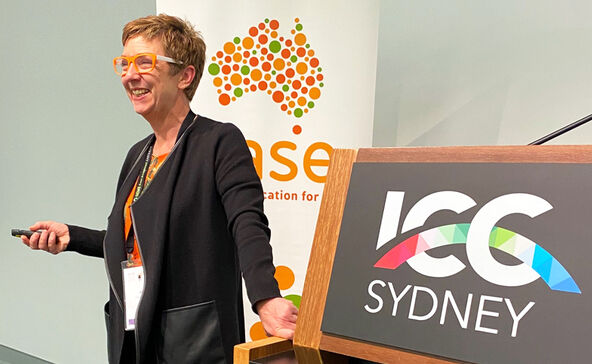- Hearing
There are three major factors that enable Teachers of the Deaf (ToDs) to reflect on their practice and improve outcomes for children who are deaf or hard of hearing, according to new research presented at the latest Australian Association of Special Educators conference (AASE) in Sydney.
Master of Research graduate and NextSense staff member Alison Hawkins-Bond carried out the research into Teachers of the Deaf (ToDs) and their reflective teaching practices, and found the top three factors that enabled them to transfer their thinking into their day-to-day practice and continuously improve were:
1. Time – allocating a routine time to reflect on your teaching increases awareness of what works and what needs changing
2. Collaboration – connecting with other ToDs individually or in staff meetings allows ideas to be shared and an understanding of other perspectives.
3. Notes – comments on lesson plans, sticky notes for reminders, recording achievement of student’s goals, or journaling, all increased ToDs’ reflective practice.
Alison, herself a Teacher of the Deaf, coordinates professional experience for the Masters program at NextSense Institute, in affiliation with Macquarie University.
‘My Masters degree research was on a topic close to my heart: how do Teachers of the Deaf know that their teaching is making a difference to the outcomes of their students who are deaf or hard of hearing?’ Alison says. ‘I investigated how Teachers of the Deaf think about their teaching practice, and what helps increase their opportunities to reflect—in other words, reflective teaching practice.’
‘It’s all about teachers doing everything possible, to better meet the individual needs of their students as there is no “one size fits all” in deaf education. Reflective practice is a way that Teachers of the Deaf can look at what is having a positive impact and ensure they reinforce that.’
Alison’s literature review found that ‘reflection’ is about Teachers of the Deaf thinking about their own practice.
So, the reflective practice part is actually transferring the knowledge from your thinking, to make some changes to what you do in your daily teaching.
‘There’s no doubt the nature of the work of Teachers of the Deaf does present barriers to implementing the three strategies—when travelling between different classrooms, schools or visiting families in their homes. But the data showed that teachers who could set up a routine time to reflect, who could seek out a critical friend, found that really effective,’ she says.
Of the 22 ToDs who participated in the research, a major focus of their reflections were their students’ learning, achievement, and enjoyment of lessons.
‘An exciting finding from my research was that this “thinking” led to change in teaching practices, and Teachers of the Deaf were coming to conclusions and questioning their practice in terms of what they needed to improve, what they needed to change, or what adjustments they might make to their teaching.’
The research adds to existing knowledge on how important reflection is for the unique role of Teachers of the Deaf to adapt to changes in technology, and advances in the field, to improve outcomes for deaf or hard of hearing students.
The AASE conference was a great opportunity to share research outcomes and ask special education teachers about the factors inhibiting and increasing their opportunities to reflect on their teaching—and see if there were any commonalities, Alison says.
This knowledge about teachers' experiences in the classroom helps NextSense Institute provide support based on what teachers tell us works for them.
Alison’s research findings were also published in the September edition of the British Association of Teachers of the Deaf (BATOD) magazine.
